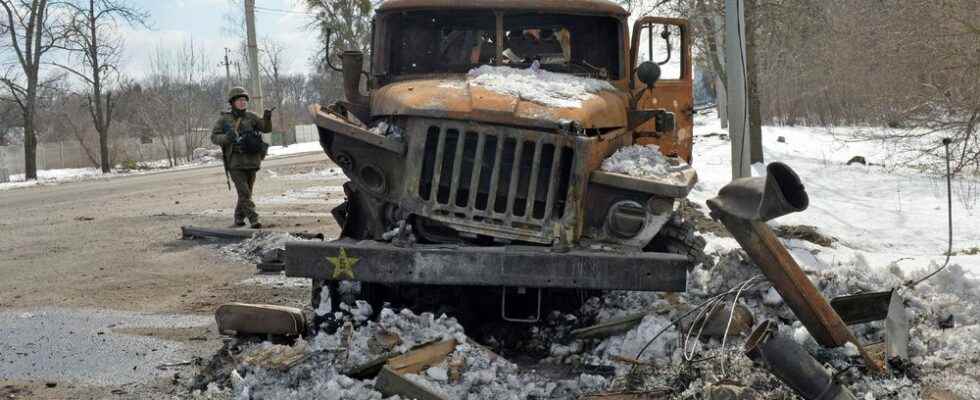The scene takes place in Moscow, on March 4, at the Council of the Federation, the Russian upper house. Gathering her courage in both hands, Senator Lioudmila Naroussova denounces the significant losses suffered by the Russian army in Ukraine. The widow of the former mayor of Saint Petersburg and political mentor of Vladimir Putin, Anatoli Sobtchak (1937-2000), thus evokes a unit of a hundred conscripts of which only four elements would have survived… before be rebuffed by the chairman of the meeting.
How many Russian soldiers have already died in Ukraine? For the second time only since the beginning of the conflict, the army made public the count of its losses, this Friday March 25: 1351 soldiers and 3825 wounded. She also announced a “concentration of her efforts on the main objective: the liberation of Donbass”. A first admission of failure in this war, at least with regard to the offensive in the west of the country, in particular around kyiv, where the Ukrainian army recently launched counter-attacks.
According to kyiv, Vladimir Putin would have lost ten times more soldiers (15,300), while the Russian daily Komsomolskaya Pravda reported Monday, March 21, on its website, 9,861 dead and 16,153 injured. A statement quickly withdrawn by this newspaper close to the Kremlin, which said it was the victim of hacking. NATO, for its part, estimated Wednesday that 7,000 to 15,000 Russian soldiers would have died. Almost as many as the number of Soviet soldiers killed in a decade of war in Afghanistan (15,000). And more than the US Army in twenty years of operations in Iraq and Afghanistan (8500).
Five generals killed
“10,000 Russian dead, if we take the standard estimate of one dead for three wounded, that brings us to 40,000 Russians out of action, about a quarter of the forces engaged in Ukraine, notes Olivier Schmitt, director of studies and research at the Institute for Advanced National Defense Studies. These estimates are considerable and speak of the extreme destructiveness of the contemporary battlefield. At this rate, the Russians will not be able to maintain their campaign for very long, unless the attrition of the Ukrainian army is even stronger.”
A Russian multiple rocket launcher was destroyed on March 16 near Kharkiv, Ukraine.
afp.com/Sergey BOBOK
Social networks relay funerals every day, in particular those of members of the special forces. Five generals also lost their lives. “This shows that the Russians do not control all the territories they occupy and are victims of actions in the rear, but also that the lack of morale and communication requires the presence at the front of these generals”, underlines Olivier Schmitt .
Difficult, therefore, to believe the official figures. Especially since the minimization of losses is an old habit in Moscow. The authorities have long refused to reveal the carnage caused by the Covid-19 epidemic over the past two years – more than 350,000 deaths, but at least twice as many taking into account the excess mortality. “There is a risk that we will not know the truth about the deaths in Ukraine”, fears Anne Le Huérou, specialist in contemporary Russia at the University of Paris-Nanterre.
“Because of the Perestroika and Glasnost initiated by Gorbachev in the 1980s, the traditional silence concerning the human losses had been partly broken thanks to the first movements of the mothers of soldiers, who made it possible to reveal what was happening in Afghanistan, continues the sociologist. The logic of secrecy on the sending of conscripts during the first war in Chechnya, thanks to them, had not held. Today it is different, because civil society is much more under control since Putin’s arrival.”
Already, during the clandestine operations of the Russian army in the Donbass, in 2014 and 2015, the Kremlin had refused to depart from its official line of non-intervention. But faced with the accumulation of evidence, starting with the return of coffins of soldiers, the authorities had explained that they were volunteers, before affirming that they were soldiers who had left to fight on their time off. So many fanciful explanations that it is no longer possible to serve Russian public opinion since the February 24 offensive.
